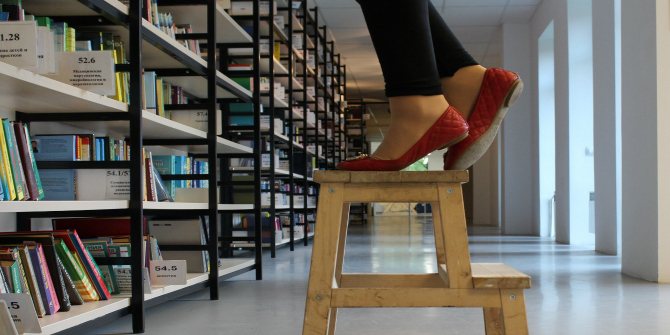In Conflict in the Academy: A Study in the Sociology of Intellectuals, Marcus Morgan and Patrick Baert yield key insights into the dark underside of academe by exploring the dynamics behind a contentious dispute, known as the ‘MacCabe Affair’, over a faculty appointment of an obscure, young scholar at Cambridge University through the framework of cultural sociology and positioning theory, writes Jeff Roquen.
 This review originally appeared on LSE Review of Books.
This review originally appeared on LSE Review of Books.
Conflict in the Academy: A Study in the Sociology of Intellectuals. Marcus Morgan and Patrick Baert. Palgrave Macmillan. 2015.
In one of the most memorable scenes in the now classic film Dead Poets Society, the newly-hired English teacher at Welton Academy, John Keating (Robin Williams), asks one of his young men to read a portion of their textbook aloud. During the recitation of the scholar-written preface, the class reflexively begins to take notes and uncritically accepts how the greatness of a poem can be measured by plotting its importance and level of perfection on a graph. In simultaneously illustrating the method on the blackboard, Keating initially appears to endorse the author. To the surprise of his students, however, he unexpectedly exclaims: “Excrement. That is what I think of Mr. J. Evans Pritchard. We’re not laying pipe. We’re talking about poetry.” Indeed, visceral, hyperbolic, and ad hominem attacks on peers are not anomalous in the teaching profession.
In the hallowed halls of higher education, the political is often personal. Collegiality? Across campuses around the world, the war of ideas has created a number of dysfunctional university faculty-cultures marked by fierce ideologically-bound agendas, truculence, self-serving criticism, and petty slights. In Conflict in the Academy: A Study in the Sociology of Intellectuals, Marcus Morgan and Patrick Baert yield key insights into the dark underside of academe by exploring the dynamics behind a contentious dispute over a faculty appointment of an obscure, young scholar at Cambridge University through the framework of cultural sociology and positioning theory.
In Part One, the authors set up their study by offering a synopsis of the sordid affair that flared tempers and sparked vitriol at the fourth oldest university in the world. After taking his PhD from Trinity College, Cambridge in 1976, Colin MacCabe became a University Assistant Lecturer (UAL) in the English department – an entry-level appointment with potential to earn a more permanent position subsequent to the approval of his colleagues. That, however, would turn out to be anything but a mere formality. Why? Rather than merely appreciating the linguistic genius of Shakespeare, Lord Byron, and James Joyce, for example, MacCabe, who had incorporated the structural Marxism and post-structuralism of Louis Althusser and Michel Foucault respectively, dedicated his scholarship to applying social science methods to expose how the literary canon (supposedly) either served or was co-opted by the ruling and oppressive bourgeois elite.

Beyond the fact that many members of the English department had been steeped in conservative traditions, Cambridge was also experiencing generational change between scholars from the WWII era and incoming baby boomers. At the same time, a spike in university enrollment toward the end of the twentieth century invariably raised the stakes of methodological supremacy. Over the autumn and winter of 1980-81, the Faculty Board, the Upgrading Committee, and the Appointments Committee engaged in several heated debates and held several discordant and inconclusive votes on the academic future of Mr. MacCabe. Passions continued to rise, and the imbroglio gained worldwide attention.
In their rendering of why and how the “MacCabe Affair” became an intellectual flashpoint and fault line in the academy in Part II, Morgan and Baert employ the analytical tools of the brilliant sociologist Erving Goffman (1922-1982) from several of his works including The Presentation of Self in Everyday Life (1959), Interaction Ritual: Essays on Face-to-Face Behavior (1967), and Frame Analysis: An Essay on the Organization of Experience (1974). In his terms, each side constitutes a performance team that actively attempts to manufacture and promote a version of reality on the basis of their vested interests. For those who backed the appointment of MacCabe (the “pros”), it was imperative to elevate the question to the point of being sacred – as if the future of civilization depended on the outcome. In contrast, the “antis” (the faction against the appointment) pursued the opposite strategy of reducing the dispute to one of inconsequential banality.
According to the Goffman-inspired interpretation of the authors, therefore, securing the Senate House as the site of the grand debate was an unqualified victory by the pros. In doing so, they were able to choreograph the drama and heighten the symbolic significance of the event. Despite seizing the high ground, however, the case made by the pros on behalf of their stalking horse, who personified a new and controversial paradigm for examining literature, withered to some degree after several highly charged rounds over control of the narrative. After portraying the antis as antiquated, biased, and rigidly conservative to some success, the antis countered with similar charges, defended the literary canon as sacred, and cast the pros as nihilistic heretics deserving of excommunication from the field.
Contrary to the locus of the summary by the authors, MacCabe was not at the epicenter of the academic row despite its eponymous name. The assault by the entrenched faculty, who were the guardians of the traditional, humanistic approach to literature as espoused by the late Cambridge scholar Frank Raymond Leavis (1895-1978), was primarily aimed at the new Regius professor, Frank Kermode (1919-2010), and his postmodernist-compatible scholarship. In fact, the Leavisites in the department openly scorned his views with even more venom than his mentee Colin MacCabe – who was ultimately denied tenure.
In perhaps the most unforgettable scene of Dead Poets Society (1989), Mr. Keating jumps up on his desk, invites his students – one-by-one – to view the world from a new perspective, and declares: “Just when you think you know something, you have to look at it in another way.” Unfortunately, a significant percentage of the modern professoriate could use such an exercise for personal and professional elevation. Hence, the illumination of the “MacCabe Affair” by Morgan and Baert through a Goffmanesque-perspective, which runs less than one hundred pages, will hopefully spark a wider investigation to explain how hubris, intolerance, and careerism have partly contaminated a vocation that must be rooted in humility, tolerance, and empathy for the welfare of the most important members of the academic community – the students.
Jeff Roquen is an independent scholar based in the United States.








1 Comments